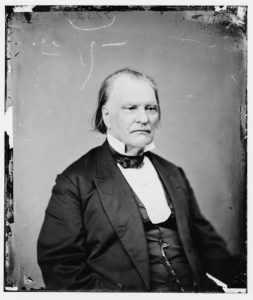150 years ago today the 39th U.S. Congress ended and the 40th convened. This was an unusual move, but Congress wasn’t taking any chances. In the last days of the 39th, Congress enacted measures that curtailed President Johnson’s policies and power. It ended the president’s lenient reconstruction by dividing the South up into 5 military districts and making readmission to the Union dependent on passage of the 14th Amendment to the federal Constitution. Congress severely limited presidential power to appoint and fire officeholders and even impinged on his authority as Commander-in-Chief. Apparently the legislators wanted to keep up the pressure and keep their eyes on Mr. Johnson: “Unwilling to allow the president the customary intervals between sessions of Congress in March and December, the lawmakers took advantage of a seldom-used clause in the Constitution to convene sooner.” [1]
You can read about the last and first day of Congress in the March 5, 1867 issue of The New-York Times. In the House incoming Representative James Brooks said the 40th “was in danger of placing itself on record, not as a rump Congress, but the rump of a rump Congress. He admitted its de facto power, but denied that it had an authority as a de jure body, and presented a protest signed by the Democratic members against the organization of the House while seventeen States were unrepresented.” [I thought it was ten states.] Schuyler Colfax was re-elected Speaker.
“The Senate organized promptly at 12 o’clock, Hon. B.F. WADE in the chair, as President pro tem., having been elected to that position this morning during the last hour of its session. During Andrew Johnson’s administration the President pro tem. was especially important – under the law of the time that officeholder was next in order of succession to the Presidency. If Andrew Johnson was ever impeached and convicted, Mr. Wade would become president. Benjamin Franklin “Bluff” Wade , was “the old Ohio radical whose ideas about female suffrage and the relationship between capital and labor were so advanced that his election [to President pro tem.] has been called a turning point in the impeachment process. Chosen because of his radicalism, he nevertheless frightened less outspoken colleagues.”[2]

